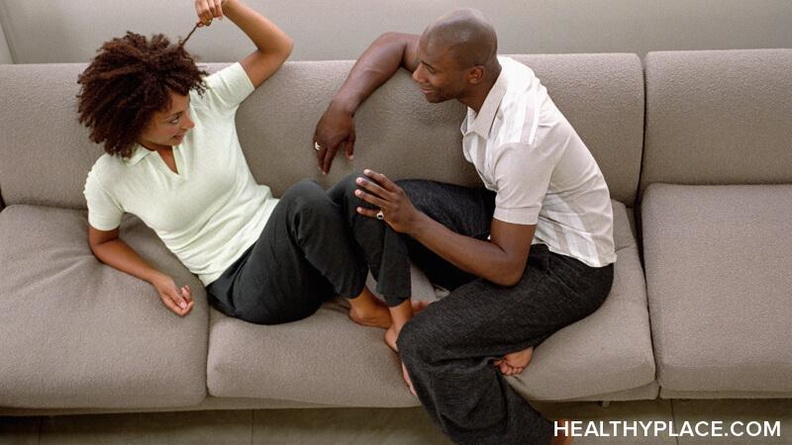Are You Satisfied? Ebony Asks Black Women

For too long, African-American women and their sexual needs have been ignored. Over the decades, media-glorified studies have claimed to break new ground in regard to sexuality, but they seldom addressed the needs and concerns of African-American women. In fact, studies that addressed Black women usually focused on transmission of disease.
Ebony magazine readers wanted to know more. What turns us on, what turns us off? What are our major problems and concerns? Where do we go when we have problems or questions?
In response to the thousands of reader queries the magazine continued to get, Ebony undertook a major study to answer some of these questions. Ebony has commissioned Hope Ashby, Ph.D., a psychotherapist based in New York City, to help design a groundbreaking new sex survey that delved into the hearts and sex lives of Black women. The survey results were published in October 2004. The magazine wanted to hear about the issues that affect the quality of black women's lives and relationships. In the end, they hoped to shed some light on personal concerns and let black women know that they are not alone; other women have the same problems that you do. And there are solutions that can lead to a healthier, more fulfilling sex life.
Here, Dr. Ashby, offers some insight into Black women and sexuality.
Question: What are the sexuality problems affecting Black women?
Dr. Ashby: A major sexuality problem facing Black women today is HIV/AIDS. Another is the lack of information available in our communities. There is a lot of misinformation or just nonexistent information about anorgasmia, low libido, painful sex and even simple things such as the effect of hormones on sexual functioning.
Question: Are there sexuality issues that affect Black women more so than other women?
Dr. Ashby: A continual complaint about their partners not wanting to wear condoms. Black women also bring up the inability to have an orgasm and low or lost libido as White women do.
Question: Are there aspects of sexuality that Black women seem to enjoy an advantage?
Dr. Ashby: I think that the one advantage that Black women have is high body esteem. We tend to be more comfortable in our bodies, especially Black women who are plus-size. Having a high body esteem helps to enhance one's sexual feelings about herself.
Question: When a Black woman has a problem with sex, where does she go for help and advice?
Dr. Ashby: Black women tend to go to their friends; it is rare that they go to their doctors with sex issues because they are unaware that there is help out there for these types of problems. There are professionals, like myself, who specialize in sexually related issues and can help. Some medical doctors are beginning to listen to their patients' sexuality complaints and learn about the area of sexual medicine.
Question: For those who are not comfortable talking to their partners, what advice do you have?
Dr. Ashby: First and foremost, don't choose to start having these conversations when you're about to have sex. That is the wrong time. It is important to begin these conversations in a neutral, non-threatening place, especially if you haven't been having orgasms and you have been faking. Begin by asking your partner what he thinks about your sex life. Are there fantasies he would like to explore?
Question: How do history and culture affect our sexuality?
Dr. Ashby: Throughout White history, Black women have been portrayed in two paradigms--that of Jezebel and that of "mammy." Jezebel being the slut, promiscuous woman and "mammy" being completely asexual but always passive and caretaking. Because Black women have generally been looked at through these two lenses, it has been difficult for us to find middle ground. How can you be a comfortable sexual being when you could be perceived as a slut? This message is also pervasive in American culture. Little girls are taught that sex is to be saved for marriage without ever hearing any mention of enjoyment. It gets conveyed in a subtle way that pleasure is reserved for your partner and that you are the conveyer of that pleasure. Thus Black women are often caught between being a "good girl" (nonsexual), or a "bad girl" (sexual). Another aspect of Black history that is tied to these paradigms is that as slaves Black women were regularly raped and sodomized by their masters, and also sold off from their families. This traumatic history is still an unconscious remnant in the lives of Black women.
Question: Why do some Black women feel bad or "dirty" about initiating sex with their mate?
Dr. Ashby: It is an issue of feeling they are not entitled to pleasure and not recognizing themselves as sexual beings with needs of their own. This also goes back to how gifts are socialized in American society. Some girls are socialized to think that sex is dirty and that only bad things can come of it if you engage in sex. Boys, on the other hand, are socialized to think that they can have sex with anyone at any time and that it is their right to do so.
Question: Based on your research, how do Black women feel about oral sex and anal sex?
Dr. Ashby: Black women are more comfortable today than they were a few years ago in giving and receiving oral sex. I usually hear about male partners having problems giving oral sex. Anal sex is still relatively taboo for Black women.

Question: What can mothers do to make sure their daughters are informed about sex?
Dr. Ashby: It is imperative that mothers sit down with their daughters and talk about sex and sexuality. Adolescence is a time for experimentation; adolescents question their sex appeal, whether they are gay, straight, or bisexual, whether oral sex is "sex," and how to go about it. Being open and honest with your teen is key to impacting their behavior. Even though the information is available, children still need and seek guidance from the ones they trust most--their parents.
Question: Are Black women today more comfortable in accepting their lesbianism?
Dr. Ashby: From many conversations with my patients, it seems that Black women are much more comfortable than they were a few years ago about accepting their lesbianism, but it is still a struggle. My patients state that the African-American community still has difficulty accepting and dealing with the gay and lesbian subpopulation. Black lesbians are confronted with a triple handicap--being Black, female and a lesbian. This comes with a host of challenges that White lesbians don't have to face.
Question: Many women are concerned about whether sexual desire decreases during menopause. Does it?
Dr. Ashby: The wonderful thing about being human is that we are all different and some are lucky not to have a decrease in sexual activities. I have seen some women who are barely affected by the changes brought on by menopause and others whose lives are completely devastated by the hormonal imbalance.
Question: Why is HIV affecting Black women disproportionately?
Dr. Ashby: Because many are engaging in sexual activity without condoms. Many women I see as patients say that their man won't wear a condom because it "feels" better; or if she insists that he wears one, he accuses her of cheating. If your man won't wear a condom, there are ways you can protect yourself. First, there is a female condom available; secondly, there are nonoxynol-9 spermicides that can be inserted into the vagina prior to intercourse. Thirdly, abstinence is always an option until you find that someone who will respect you and your body. The ultimate form of caring and respect is when someone places your feelings and needs above their own.
Question: How do Black women approach masturbation and sex toys? Are there feelings of guilt?
Dr. Ashby: Masturbation is still somewhat taboo for Black women as it is seen as "dirty." My patients have said they are embarrassed to seek out sex toys and feel that buying them would make them appear "loose." Sex therapists have had their patients use sex toys either with a partner or alone as a way to figure out what turns them on and what turns them off.
Question: If there is one message about sexuality that you would like to deliver to African-American women around the country, what would that be?
Dr. Ashby: I think the message I would like to deliver to both African-American and African Sisters is that you are much more than disease carriers and baby-makers. You are sexual beings with needs and desires, and you are entitled to healthy, fulfilling sexual lives, and that there is help for your sexual problems. Everyone is entitled to a fulfilling sex life.
We do it but we don't like to talk about it. Sex, that is.
African-American women may be stereotyped as Lil' Kims in music videos, but for the most part, black women can be extremely prudish when it comes to discussing sex.
That's why the results of a landmark sex survey of black women appearing in the October 2004 issue of Ebony magazine sure raised a few eyebrows.
For starters, according to the survey of 8,000 women nationwide and abroad, brothers apparently aren't taking care of their business. When asked "How satisfied are you with your sex life?" 26.8 percent of respondents said they were "somewhat satisfied," 13.6 percent said they were "somewhat dissatisfied," and only 15.7 percent of the women said they were completely satisfied.
Even more telling, while "cheating" is usually seen as a primarily male behavior, the Ebony sex survey found that 44.2 percent of the women said they had cheated on their partners, while 41.4 percent said they had not strayed.
The 56-question survey asked about the kind of sex that most black women won't even discuss with their best friends, like what is your preferred position for sex and method of penetration. That black women tend to shy away from openly discussing their sexuality is understandable.
Black women were objectified and sexually abused during slavery and the Jim Crow era. Today, young black women are demeaned as sexual objects in rap lyrics and videos. In real life, black teenage girls are being sexually assaulted by older men, including male relatives, at an alarming rate.
Ebony's survey found that 41.9 percent of black women agreed with the statement: "The stereotypical media portrayal of black women (as loose, unrestrained, bossy) has had a negative impact on our sexual development." And about 37 percent of respondents said they had a history of sexual abuse.

Yet the "ready-at-the-drop-of-a-hat" black woman is largely a myth.
According to the Ebony survey, although 59.7 percent of black women said "masturbation is healthy and normal," 25.3 percent of those women said they never masturbate. When asked: "How often do you experience orgasm?" 22 percent said "very often," 25.2 percent said "often," 26.4 percent said "sometimes," and 18.4 percent said "once in a while."
"This was an issue that we needed to address," said Lynn Norment, Ebony's managing editor. "I have done dozens of relationship stories over the years and I saw the need. There's been sex surveys about women in general, but black women were almost a footnote in those surveys. I thought it was time for us to focus on black women and the issues that we face in our lives."
The survey was conducted online. But some respondents mailed their responses to Ebony. Obviously, an online survey gave respondents a lot of privacy. Still, there are indications that respondents were uncomfortable answering some questions.
For instance, consider the subject of oral sex.
Only 2.7 percent of women surveyed admitted giving oral sex, while 11.6 percent said they were recipients of oral sex, and a whopping 82.1 percent claimed both parties engaged in oral sex. But when asked: "How often do you experience oral sex?", 16.9 percent said very often; 29 percent said "often;" 21.9 percent said seldom; and 24.4 percent of the respondents said "sometimes."
I can't prove this, but 2.7 percent seems an awful small number for givers. What that tiny number says to me is oral sex is still so taboo in the black community, most black women still won't admit to giving oral sex without getting it too.
Most of the respondents live in the South (37.9 percent), are college graduates (52.7 percent) and have never been married (50.2 percent).
"I'm a minister's daughter," said Hope Ashby, the New York City- based sex therapist who helped Ebony formulate the sex survey. "My mother is a Southern belle, and we didn't discuss this stuff. That is why this is quite wonderful. Black women deal with the same issues as white women. We are not having as much sex as we might want, and when we are having sex, we are not being sexually satisfied," she said.
Given the "down low" phenomenon -- that is, black men who have sex with women but do not identify themselves as gay or disclose to their female partners that they also have sex with men -- I was surprised Ebony didn't ask outright about condom use.
Forty-eight percent of respondents said they were very concerned about "brothers on the down low," 16.5 percent said they were "somewhat concerned," and 27.3 percent said they were not concerned.
"What we didn't want to do was alienate people from answering the questions," Ashby said. "Being in your face about it makes people go the other way and not want to talk about it."
Hopefully, Ebony's sex survey will jump-start the real conversation.
SISTERS SPEAK OUT
1. How satisfied are you with your sex life?
Completely satisfied 15.77%
Mostly satisfied 25.42
Somewhat satisfied 26.85
Somewhat dissatisfied 13.62
Mostly dissatisfied 9.09
Completely dissatisfied 9.25
2. How often do you engage in sexual intercourse?
Daily 6.36
Once a week or more 41.64
Once a month 11.69
Two or three times a month 23.31
Once or twice a year 9.05
Not at all 7.95

3. How often would you like to have sex?
Daily 32.01
Once a week or more 58.04
Once a month 1.79
Two or three times a month 6.22
Once or twice a year 0.44
Less than once a year 0.18
Not at all 1.32
4. How often do you experience orgasm?
Very often 22.07
Often 25.23
Sometimes 26.43
Once in a while 18.41
Never 7.86
5. Have you ever cheated on your partner?
Yes 44.23
No 41.47
Considered it, but did not 14.29
The survey included 8,000 black women, most of whom answered questions online. Some mailed responses to Ebony. The survey was conducted between March 8 and April 30, 2004.
APA Reference
Staff, H.
(2021, December 17). Are You Satisfied? Ebony Asks Black Women, HealthyPlace. Retrieved
on 2026, March 2 from https://www.healthyplace.com/sex/women/are-you-satisfied-ebony-asks-black-women

